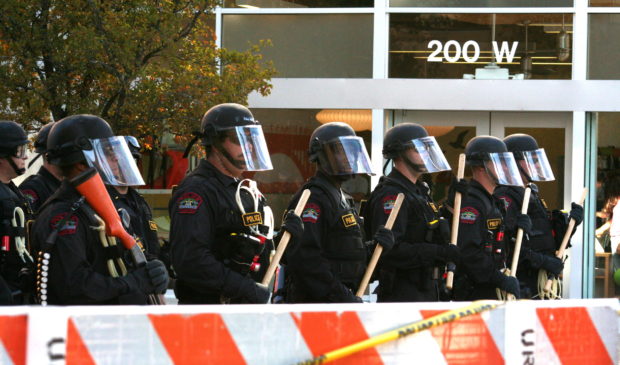City overlooks police overtime dollars
Thursday, November 19, 2020 by
Ryan Thornton When City Council cut $21.5 million from the Austin Police Department budget in August, it also provided $3.174 million that could be used for overtime as the department adjusted to its budgetary constraints. The dollars were intended to buy time as Council considered future steps to reimagine public safety, but the city has not taken advantage of the money while Police Chief Brian Manley has created an adaptation plan that does not account for the added overtime potential.
According to Assistant City Manager Rey Arellano, the reason is that there has been uncertainty at the city manager’s office regarding Council’s intent for the earmarked funds. Meanwhile, Arellano said City Manager Spencer Cronk has been exploring “how best to formalize the accessibility” of the funds.
At Council’s Public Safety Committee meeting on Monday, Mayor Steve Adler said the police department could possibly have made better use of time and money if it had drawn down the available overtime funds. Without acknowledging the funds, Manley has proposed a plan to work within the department’s budget by bringing officers from other units into patrol positions.
“I have the work that you did in August where you laid out in pretty significant detail what it was that you needed to do based on the assumptions that we were making at the time,” Adler told Manley. “What I have not seen is that same analysis that would have been done in August if it had been pointed out to you that the Council specifically earmarked an additional ($3 million) … for overtime.”
Manley has proposed moving 95 officers into patrol positions from other roles like DWI enforcement or district representatives. The department plans to make the transfers by Jan. 17, but the proposal has not yet been approved by the city manager’s office. Adler agreed to take an opportunity at an upcoming work session to clarify the intent for the $3.2 million in case it may impact the department’s response to a reduced budget.
“It seems to me really imperative that we get to a resolution of this issue pretty quickly,” said Council Member Kathie Tovo, who voluntarily joined the committee meeting along with Adler and Council members Alison Alter and Ann Kitchen.
Manley said the extra money “gives (the department) some flexibility” but added that current vacancies and an increased attrition rate will continue to drain the department’s overtime resources. The department has begun efforts to quickly move officers into patrol units due to a particularly high attrition rate over the past several months. Over the next year, Manley estimated the department could see as many as 180 vacancies added to the department’s existing 45 vacancies.
To fill the patrol positions, the department first looked to units with jobs that could also be carried out by patrol officers, then to positions that could be eliminated and performed by other public or private entities, and finally to positions that are considered critical.
In this third category, Manley has proposed cutting 18 sworn officer positions – half of the unit – from the District Representative Program, which provides non-emergency assistance and outreach at the neighborhood level. While many of the program’s positions could ultimately be filled by civilian officers, the department plans to supplement the remaining positions with temporary jobs for cadets to gain exposure to community policing before entering the academy.
“The District Representative unit was a very difficult one for us because in this day when we’re focusing on community policing, that is one of the key areas where we’re doing that … but we were forced with having to make very difficult decisions because it’s not as if we had officers performing work that was not important to our community, really, anywhere in the department,” Manley said.
Kitchen requested further data justifying the need to transfer officers into patrol from their “very important” role as district representatives. Kitchen added, “Obviously we need to keep up our standards for response time in the community that the patrol officers are responsible for, but I’m wanting to make sure that these decisions, particularly when you’re talking about moving officers out of (the District Representative Program), that the positions you’re moving in are necessary to meet the standard and are not just based on a projection of population.”
Adler said the clarification about the $3.2 million for overtime “might lead us to a different place” from the department’s current proposal. Alter stressed the urgency of creating a plan for Council to consider as soon as possible so that the detailed work of restructuring the department may begin.
This story has been changed since publication to better reflect the city manager’s perspective on the funds earmarked by Council. Photo made available through a Creative Commons license.
The Austin Monitor’s work is made possible by donations from the community. Though our reporting covers donors from time to time, we are careful to keep business and editorial efforts separate while maintaining transparency. A complete list of donors is available here, and our code of ethics is explained here.
You're a community leader
And we’re honored you look to us for serious, in-depth news. You know a strong community needs local and dedicated watchdog reporting. We’re here for you and that won’t change. Now will you take the powerful next step and support our nonprofit news organization?









